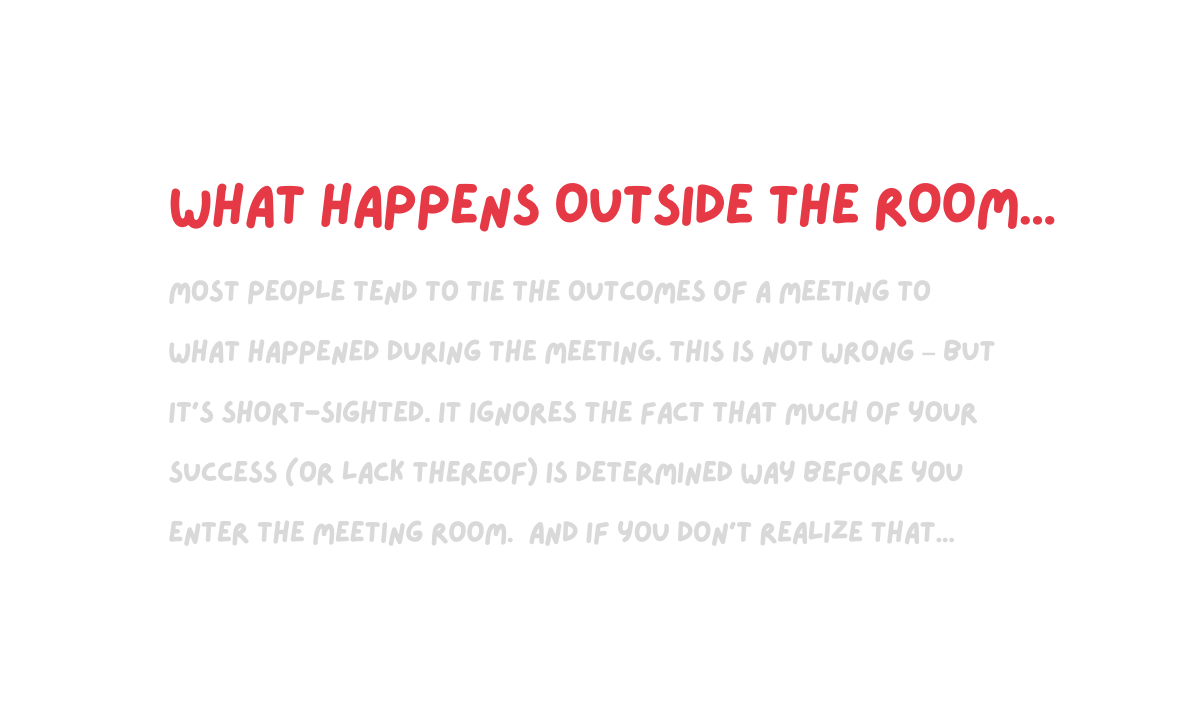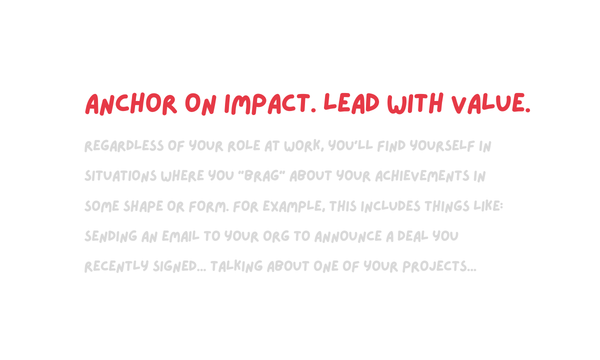Your influence doesn't start inside the room

Here's a confession: I love going on YouTube and rewatching classic TV or movie scenes with gamechanging protaganist speeches. It's my guilty pleasure.
(Think Tom Cruise scenes from A Few Good Men, Robin Williams monologues in Good Will Hunting – or any time Martin Sheen speaks in The West Wing, really.)
Of course, it's probably no surprise why living vicariously through these scenes produces incredible dopamine hits. Because we simply don't get to experience it in real life.
One reason these scenes are unrealistic is obvious: things are rarely so simplistic. We're usually forced to deal with shades of grey (and here's what happens if you can't), rather than black or white.
But there's another much less obvious reason why these gamechanging monologues are unrealistic.
And that reason is this: Influencing starts way outside the room.
What happens outside determines the success inside
Think about the last time you were on the hook for an important presentation or discussion. What do you remember about it?
Here are the types of answers you can generally expect from people:
- "It went well; the audience was nodding along the whole time."
- "It didn't go too well; I could've answered some questions better."
- "I didn't get pushback, but I could tell the audience wasn't convinced."
What you'll then notice is this: most people tend to tie the outcomes of a meeting to what happened during the meeting.
This is not wrong – but it's short-sighted. It ignores the fact that much of your success (or lack thereof) is determined way before you enter the meeting room.
And if you don't realize that – your ability to influence will be capped.
(Oh, and I'm not talking about basic things like prepping the right materials or rehearsing ahead of time either. That's tablestakes.)
So what exactly do we have to get right outside of the meeting room to ensure we're setting ourselves up for success?
Let's start with the first thing: credibility.
👋 Join 5000+ readers and subscribe to Herng's Newsletter for free:
#1 On Credibility
The first thing to know is this: no message ever lives in isolation. Even the most seemingly factual, objective, or innocuous statement does not get evaluated on its own merits.
What does this mean? It means that a message is always tied to a person, a team, or a brand – and everything else associated with it. It then gets judged accordingly.
For example, consider the following statement:
"Due to rising competitive pressures, we need to increase our speed of customer acquisition, which requires 50% more in marketing budgets."
Do you buy the argument? Well, even if I give you the entire pitch deck associated with this spiel, you probably still don't feel like you have enough context.
Because you're probably wondering about things like:
- "Who is making this ask? How well do they know the market?"
- "What's this person's reputation? Do they tend to deliver?"
- "Is this person's team judicious with resources? Can they be trusted to execute and run good governance?"
- "How aggressive does this team tend to be? Is 50% what they actually need, or just an anchoring point for negotiation?"
What you'll notice is this – none of these questions have much to do with what actually transpires in the room.
Sure, you can go into the meeting room armed with robust analysis, polished materials, and superior delivery – but you simply cannot create credibility out of thin air.
Most of it happens way before you step into the room.
In fact, if you dig a little deeper, you'll realize that there's even more nuance to this concept of credibility.
Because credibility doesn't simply boil down to "I trust everything they say" vs. "I don't buy what they say at all" – the outcomes of influence are never that binary.
Rather, your credibility also affects things like:
- The extent to which people apply a haircut to what you say (or conversely, how much sandbagging they think you're doing)
- Whether people feel the need to throughly scrutinize your inputs and assumptions before moving forward
- How high of a threshold people expect you to clear when it comes to burden of proof
All these things have a material impact on not just the outcomes of influencing, but also the time and effort involved in the process. There's influencing – and then there's effective influencing.
And your track record is a big determinant of that.
Let's now talk about the second thing that takes place way beyond the meeting room: consistency.
#2 On Consistency
I used to think that the act of influencing followed a simple protocol: conduct the right analysis, prepare the right materials, deliver a great presentation – then get a yea or nay right away.
It turns out that the more complex things become (and the higher the stakes are), the less realistic this is.
Why? Because at the highest levels, there are simply too many competing voices. Every ask is important; every document is well-polished; every presentation is tight.
But not everything can be prioritized.
So what happens as a result? Well, decision-makers find other ways to sift through the noise, in order to identify what truly holds water.
This is when repetition and consistency become critical filters. Neither of which happens in the room.
Because believe it or not: it is easy to tell the right story at the right place and the right time – if you only have to do it once. By contrast, it is much harder to demonstrate the discipline of sticking to the same song sheet repeatedly over time.
And for the few people who are able to demonstrate that discpline? Their message is invariably stronger and more effective, because they're able to signal that:
- What they're saying is clearly important enough for them to stick to it over time (vs. telling a different story based on "flavor of the month")
- What they're saying is clearly anchored on long-term thinking (vs. some opportunistic pitch based on short-term circumstances)
- What they're saying can also stand the test of time (and isn't rooted in false urgency or masked by outlier trends)
In fact, if you want to think of it very transactionally – it's even more obvious why repetition not only doesn't spoil the prayer, but is critical in enabling it.
Because here's the thing: you need to think of your comms as a currency. You can only represent so many messages before you create "inflation" and dilute the importance of what you say.
(Imagine putting 10 bullet points on a slide and expecting all of it to land with your audience. Or giving someone 10 pieces of feedback and expecting them to action on all of it. It never works.)
In that sense, the people who are consistent with their messaging over time are literally putting their money where their mouth is.
Why? Because they are highly selective with how they deploy their comms currency – which they know is finite and needs to be protected.
So instead of trying to land 20 messages with their stakeholders, or throwing a bunch of asks at the wall to see what sticks? They make conscious trade-off's, and only reiterate a few things, over and over again.
The priorities you hear from them today will likely still hold true a week, a month, or even a quarter from now.
Each message then carries outsized weight – which then leads to more credibility, and more effective influence.
👋 Join 5000+ readers and subscribe to Herng's Newsletter for free:
#3 On Champions
Let's talk about one last thing that is critical for influence, but also happens way before you step into any meeting room: finding champions.
(Another word for it is allies. But then you'd deprive me of my 3 C's.)
Because here's the thing: there's no hero-ball when it comes to influencing important decisions. The tough problems are rarely solved by simply delivering a brilliant presentation or making a passionate plea. That stuff only exists in movies.
Instead, you have a much better chance of influencing if you can get the right people on your side. And this almost always requires "grunt work" that happens outside of the meeting room.
So what is a champion? Well, the obvious answer is this: anyone in the meeting room who will voice their support and champion your view.
(The implied work to be done is obvious too: you seek them out way beforehand to bring them onto your side.)
But what most people don't realize is this: champions don't always have to be people who are in the room.
Instead, they can be behind the scenes. In fact, investing time to engage non-obvious champions can sometimes generate incredible dividends.
For example, instead of simply going into a meeting cold and hoping your pitch will land, imagine if you also:
- Shopped your work around with cross-functional teams, to ensure your work brings a holistic view and accounts for broader context
- Consulted trusted advisors to the decision-maker(s), and figured out how to best tailor your spiel for the audience
- Pressure-tested your materials with the right people, so you have a good sense of potential objections or even allergic reactions
The point is this: none of these people might actually sit in the actual meeting room on "gameday." But that doesn't make them any less important.
Because influence doesn't only occur when somebody in the room echoes what you say. It manifests itself also when you can demonstrate you've done your due diligence beforehand.
When that happens: you show extreme preparedness. Which begets confidence. Which begets influence.
Quick takeaways
Effective influencing does not simply come from delivering a great presentation. Your ability to influence is shaped by what you do long before stepping into any meeting room.
Specifically, this boils down to three key questions:
- "How much credibility do I have? What is my reputation? Does my track record help with or detract from my actual spiel?"
- "How consistent have I been in my messaging? Am I selective and focused? Am I telling the same story over time?"
- "Have I sought out the right champions? Do I have allies in the room? Have I consulted the right people beforehand?"
None of these things can be manufactured on the spot. They all take time and effort, way before any meeting is even on calendar.
And they always make a huge difference.


